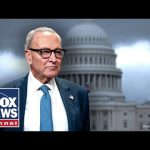As the dust settles in Virginia ahead of the highly anticipated Attorney General election, the atmosphere is thick with tension and spirited debates. The incumbent, Jason Miyares, is fervently campaigning to retain his position against his opponent, Jay Jones, who finds himself mired in controversy. With the election just days away, the stakes couldn’t be higher.
One of the major talking points of the campaign is the character and integrity of the candidates. Jones has faced scrutiny for his past reckless driving conviction, which has resulted in him completing hundreds of hours of community service. Miyares has taken the opportunity to highlight this in his campaign, even employing some tongue-in-cheek humor with the AG Association’s distribution of “Get Out of Jail Free” cards, likening Jones’ situation to something out of Monopoly. This playful jab has resonated with voters who appreciate a candidate who can maintain a sense of humor while addressing serious issues.
More than personality differences, however, the candidates’ policies set them apart. Miyares touts his record of supporting law enforcement and being tough on crime, citing his efforts in combating sexual offenses and human trafficking. He believes that his experience makes him the right candidate to ensure the safety of Virginians, particularly children. As concerns about crime rates in the state rise, many voters are looking for a candidate who embodies strength and accountability, and Miyares is seizing the moment to position himself as that leader.
On the other hand, Jones has faced allegations regarding his policies that some argue are soft on crime. Critics point to his voting record in the Virginia General Assembly, claiming he favored the early release of violent offenders and proposed the elimination of cash bail, which has sparked debate about its potential risks. Miyares, in particular, has not shied away from calling out Jones, emphasizing that proven track records in law enforcement are essential for someone seeking the role of Attorney General.
Adding to the intensity of the election, high-profile political figures like former President Barack Obama have lent their voices to support Jones. While their involvement indicates a solid backing from Democrats, it raises questions about whether this will sway voters who may be concerned with Jones’ controversies. Miyares argues that despite the celebrity endorsements, many Virginians are more concerned about character and competence than party lines—pointing out that he has received support from disillusioned Democrats who prefer his track record.
As Virginians prepare to cast their ballots, the election is turning into more than just a contest of policies; it reflects broader issues of safety, integrity, and accountability. With Miyares framing the stakes as a test of decency, and Jones clinging on in hope of a political comeback, it remains to be seen how these dynamics will play out on Election Day. One thing is certain: the spotlight is on Virginia, and the outcome will undoubtedly resonate far beyond its borders.




